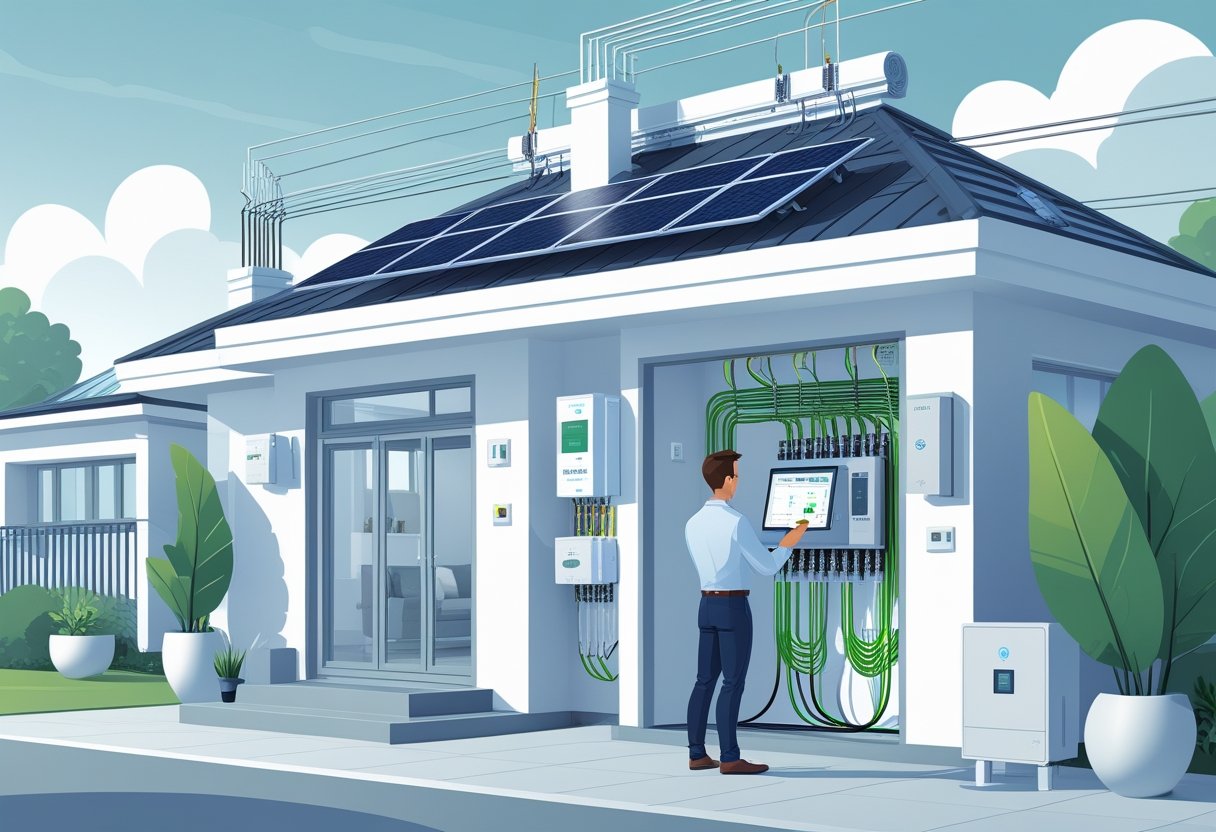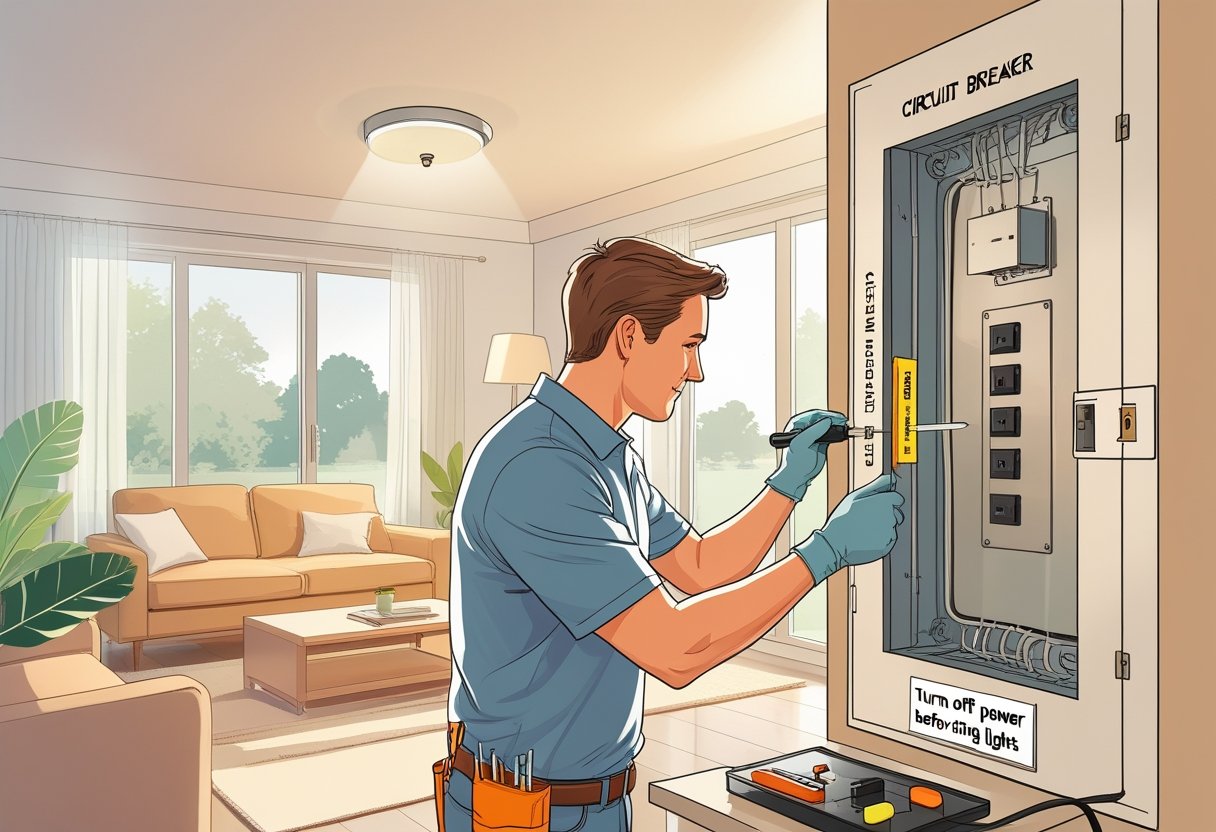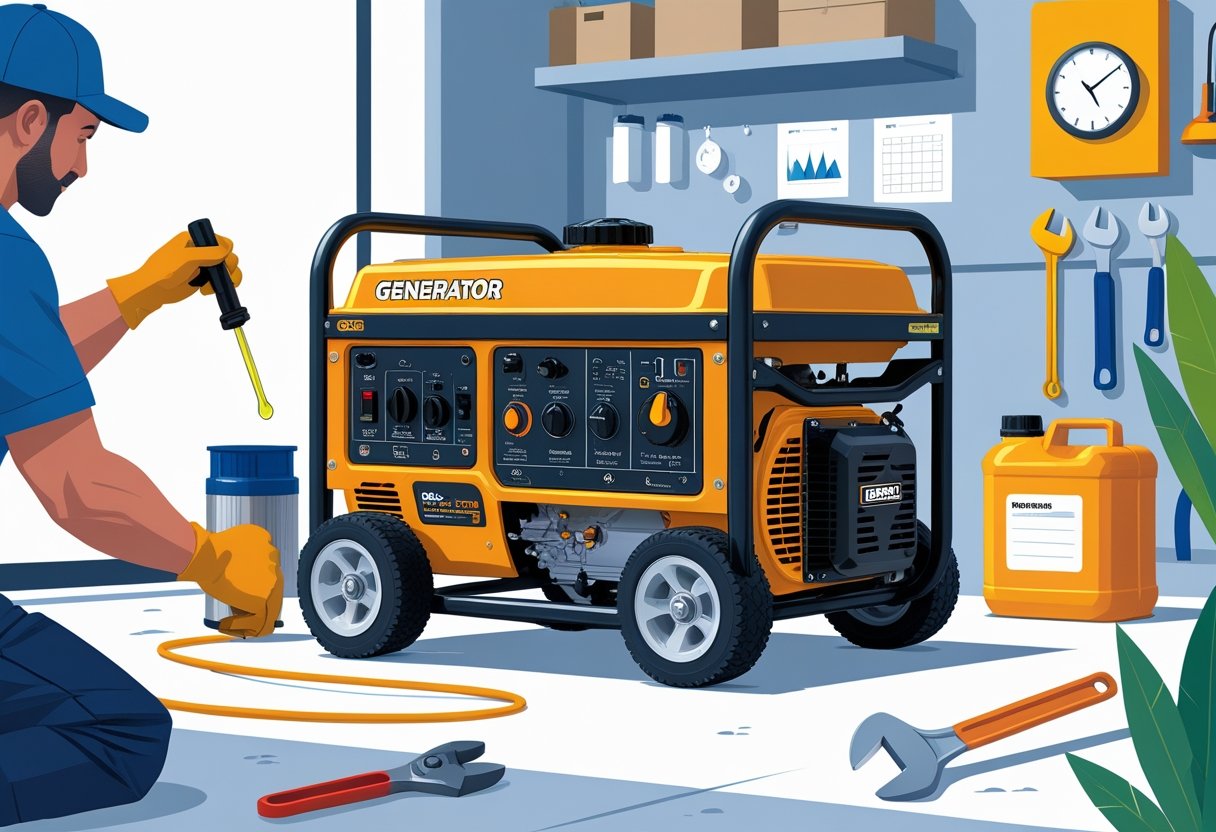Knowing when to schedule a professional generator inspection really matters if you want your home safe and your backup power dependable. Aim for at least one inspection every few years—or sooner if you spot things like flickering lights, frequent breaker trips, or odd smells. Regular checks catch problems early, so your generator doesn’t leave you in the dark when you need it most.
If you’re in Sacramento or the surrounding area, AAA Electrical Services can get a certified technician out the same day. They know how to keep your family safe and your generator ready, whether you’re bracing for a storm or just want peace of mind.
It’s smart to schedule an inspection before or after big events—storms, long stretches where you haven’t used the generator, or after home renovations. The AAA team shows up with everything they need, so you get quick fixes and honest pricing. No fuss, just a safer home.
Understanding Generator Inspections
A professional generator inspection makes sure your generator stays safe and reliable. The technician checks all the important parts, hunts for hidden issues, and confirms your system follows safety rules. If you know what’s involved, it’s a lot easier to schedule inspections at the right times and avoid headaches when the power goes out.
What Is a Professional Generator Inspection
A professional inspection is a thorough checkup by a licensed technician. They’ll look at the engine, fuel system, wiring, and that all-important transfer switch connecting your generator to the house.
They’ll test start-up, run the generator under load, and watch for leaks, weird noises, or strange smells. The idea is to find issues before they turn into failures. If you’re in places like Sacramento or Roseville, regular inspections keep your generator ready for the next outage.
AAA Electrical Services sends certified techs with stocked vans, so if they find an issue, they can often fix it on the spot. That saves you time and probably a bit of money too.
Why Generator Inspections Are Important
Inspections protect your family and home by catching things like fuel leaks or worn wiring before they become serious. If you ignore those, you risk fires or equipment damage. Regular inspections help prevent sudden failures during blackouts.
Schedule an inspection every year, or sooner if you notice flickering lights, trouble starting, or odd noises. Inspections also help keep your warranty valid and your insurance in good standing. In places like Folsom or Citrus Heights, where outages can hit, inspections make sure your backup power is actually ready.
Go with someone licensed and familiar with your area. You’ll get safer work and better advice on keeping your system in shape.
Core Safety and Compliance Benefits
Inspections aren’t just about keeping the lights on—they make sure your generator meets local codes and safety standards. That means checking wiring, grounding, and fuel connections. If you’re not up to code, you could face hazards or expensive violations.
Safety checks include looking for loose connections, making sure transfer switches work right, and confirming the generator shuts down safely if there’s an emergency. These steps protect your home and your family.
AAA Electrical Services’ techs know the state codes and safety practices. They’ll give you honest pricing and treat your home with respect. That’s worth a lot when you’re trusting someone with your backup power.
Ideal Timing for Generator Inspections
Figuring out when to schedule generator inspections keeps your backup power ready. Timing depends on how much you use the generator, the season, and whatever the manufacturer recommends. Stay ahead of these, and you’re less likely to get caught off guard.
Recommended Inspection Frequency
For most home generators, a professional inspection once a year is the sweet spot. This yearly check covers the fuel system, battery, oil, and more. If you use your generator a lot, or after big outages, you might need more frequent checks.
Generators usually run a short self-test each week, but a pro inspection goes much deeper. Let a licensed electrician from AAA Electrical Services handle it—they’ve got the tools and know-how to spot issues you’d probably miss.
Seasonal Considerations for Scheduling
Plan your inspection before seasons that bring a higher risk of outages—think winter storms or summer heatwaves. Harsh weather can strain your generator, so a spring or fall inspection helps you get ahead of problems.
If you’re in Sacramento or Roseville, where storms can pop up fast, book inspections before storm season hits. After a tough season—say, a brutal summer—have it checked for wear and tear.
Mild weather makes it easier for technicians to get the job done quickly, too.
Manufacturer Guidelines
Always check what your generator’s manufacturer recommends. They’ve put the equipment through its paces and know the ideal schedule for inspections, oil changes, and filter swaps.
Skipping their advice can shorten your generator’s life or make it less reliable. Manufacturer instructions usually cover things like fuel storage and battery checks—don’t ignore those.
AAA Electrical Services’ electricians know these guidelines and follow them during inspections. You get a generator that’s maintained by the book, which is just one less thing to worry about.
Signs Your Generator Needs an Inspection
Your generator will usually let you know when it’s time for a checkup. Listen to how it sounds, how it starts, and how it runs. Catching problems early keeps your backup power ready for the next surprise outage.
Unusual Noises or Vibrations
If your generator starts making weird noises—grinding, rattling, knocking—or starts to vibrate strangely, something’s up. Could be loose parts, engine trouble, or something else.
Don’t just hope it goes away. Schedule an inspection when you hear odd sounds or feel odd shaking. A pro will track down the cause and fix it before it turns into a bigger headache. At AAA Electrical Services, the techs show up ready to fix these issues fast, so your generator stays reliable.
Trouble Starting the Generator
If your generator struggles to start, it’s time for a check. Maybe the battery’s weak, the fuel’s stale, or something like the starter or spark plug needs work.
Repeatedly fighting to get it going isn’t normal—and you don’t want to find out it won’t start during an outage. Get a professional inspection to make sure it fires up every time, especially if you’re in Sacramento or a similar climate where weather can mess with performance.
Decreased Performance or Output
If your generator can’t keep up—maybe it’s not producing enough power, or everything seems to run weak—it’s time for a pro to look at it. Clogged filters, worn parts, or fuel system trouble could be the culprit.
You might notice flickering lights or sluggish appliances when the generator’s on. That’s your cue to get an inspection and restore full power. AAA Electrical Services offers upfront pricing and same-day service, so your home stays powered and your family stays safe.
Events That Require Immediate Inspection
Sometimes, things happen that can damage your generator without you realizing it. Getting a prompt inspection helps keep your generator running safely and ready for the next use.
After a Power Outage
A big outage can put your generator through the wringer. When the power comes back, your generator might have worked overtime, which can wear down parts or wiring.
Book a professional inspection right after any major outage. The technician will check for loose connections, damaged wiring, and fuel system issues. Skipping this step just ups your risk of problems next time the power goes out.
If you’re in Sacramento, AAA Electrical Services offers same-day inspections. Their techs show up ready to fix the most common problems on the spot, keeping your generator safe and reliable.
Following Severe Weather Events
Storms, floods, or high winds can mess with your generator’s safety and performance. Water, debris, or impact damage might not be obvious at first glance.
After bad weather, get an inspection to make sure there’s no moisture inside or hidden damage. The technician will test circuits, check for corrosion, and make sure the generator powers up like it should.
A quick check after extreme weather protects your home and avoids expensive repairs down the line. Fast, honest service with clear pricing brings real peace of mind.
Best Practices for Booking a Professional
When you’re booking someone to inspect your generator, pick a qualified pro and ask the right questions. This keeps your generator safe, working well, and up to code. Being clear upfront saves you time and headaches.
How to Find a Qualified Generator Inspector
Look for a licensed, insured electrician or technician with real experience in generator inspections. Check for state certification or Nexstar training. AAA Electrical Services, for example, offers same-day service and shows up with a fully stocked van.
Read reviews, ask friends or neighbors, and make sure the person knows your generator type and local codes. A pro who values safety and clear communication makes everything smoother and keeps your home protected.
What to Ask Before Scheduling
Before you lock in an appointment, ask about licensing, insurance, and how long they’ve worked with generators. Make sure they follow local codes and safety standards. Ask if their inspection covers the controls, battery, fuel system, and transfer switch.
Get the pricing details upfront—no one likes surprise fees. Pros should offer flat-rate pricing and be honest about what you’ll get. Ask how quickly they can come out and whether they offer same-day service. This way, you’re not left waiting when you need backup power most.
Planning Ahead for Annual Generator Maintenance
Setting up yearly maintenance keeps your generator ready and reliable. Planning ahead means fewer surprises and a smoother experience when the power goes out.
Creating an Inspection Schedule
Pick a specific time each year for a full generator inspection—usually once every 12 months, though twice a year might be better if you live where the weather’s wild. Spring or fall are good options, since you’re less likely to need the generator then.
Set reminders on your calendar or phone so it doesn’t slip your mind. Jot down key checks like oil changes, filter swaps, and battery tests. Keeping a simple schedule helps you catch little issues before they become expensive repairs.
Maybe something like this:
MonthInspection TaskNotes AprilOil and filter changeUse manufacturer’s recommended oilOctoberBattery check and load testEnsure battery holds charge and generator runs under load
A simple plan like this keeps things organized.
Coordinating with Other Maintenance Tasks
It’s actually pretty smart to combine generator checks with other regular home maintenance. If you’re scheduling an HVAC tune-up, see if your tech can coordinate with your electrical or generator maintenance team.
This saves time and helps all your home systems work together. Generator parts—fuel filters, cooling systems, control panels—can be checked alongside other appliances that rely on electricity.
AAA Electrical Services offers tailored maintenance plans for Sacramento and the surrounding area. They do same-day service with licensed techs who know how to keep your generator safe and efficient.
By combining maintenance, you cut down on visits and make sure nothing important gets missed. It’s a good way to keep your backup power ready and your family protected—without scrambling at the last minute.
Consequences of Delaying Generator Inspections
If you put off a professional generator inspection, you’re basically letting small problems fester. Little things—maybe a weird noise or a minor leak—can turn into big headaches without much warning, and that’s when repairs get expensive or the whole thing just quits on you right when the lights go out.
Unchecked generators can develop hidden faults in the engine, fuel system, or control panel. Any of these can leave your home powerless during an outage. No one wants to find out the hard way that their backup plan wasn’t actually ready.
Electrical or mechanical issues don’t just mess with performance—they can be straight-up dangerous. There’s a real risk of safety hazards like fires or carbon monoxide leaks if things go unnoticed. Licensed pros know what to look for and can catch these hazards before they get out of hand.
Skipping inspections also means your generator probably isn’t running as efficiently as it could. More fuel gets burned, and the whole system just wears out faster. That’s money out of your pocket, and honestly, who needs another thing on their to-do list?
AAA Electrical Services has same-day inspections and quick repairs. Their “warehouse on wheels” vans are stocked up, so you’re not stuck waiting days for a part or a fix. It’s a relief knowing help shows up ready.
Key risks of delaying inspections:
- Unexpected power failure
- Expensive repairs
- Safety hazards
- Decreased fuel efficiency
- Shorter generator life
Regular inspections really do protect your home and family. Especially around Sacramento, having reliable backup power isn’t just a luxury—it’s peace of mind.
Frequently Asked Questions
Staying on top of generator maintenance helps you avoid big, expensive surprises. Not sure when to book a checkup, or what to look out for? Here’s a quick rundown of the basics, from how often to call in the pros to what’s actually involved.
How frequently does my home standby generator need maintenance checks?
Most home standby generators should get a professional look at least once a year. If your generator gets a lot of use or you’re dealing with tough weather, every six months isn’t overkill. Regular attention keeps things ready for whatever comes.
What are the signs that my generator requires a professional inspection?
If your generator won’t start, sounds off, vibrates more than usual, or you catch a burning smell—don’t ignore it. Flickering lights or weird interruptions when it’s running mean it’s time to get it checked.
Can you detail a preventive maintenance checklist for home generators?
A basic checklist: check oil and coolant, inspect the battery, clean the air filter, and test the transfer switch. Your electrician should also run the generator under load to make sure it actually powers your stuff.
At what intervals should industrial generators be professionally serviced?
Industrial generators work harder, so plan on service every 3 to 6 months. Some places stick to a schedule based on run hours to be extra sure things won’t break down during long stretches.
What should be included in an annual generator service?
Annual service should cover oil and filter changes, battery tests, a look at the fuel system, and checks on belts and hoses. You want a full electrical system test, too. And don’t forget the transfer switch and control panel—they need a good inspection and test to make sure everything’s safe.
What could happen if I skip regular generator inspections?
When you skip regular inspections, you’re basically inviting unexpected breakdowns right when you need power most. Faulty parts might mess with the engine or fry the electrical system. Neglecting maintenance also bumps up the chances of unsafe operation—nobody wants to put their home or family at risk like that.
If you’re in Sacramento or nearby and want professionals to handle your generator, AAA Electrical Services is around. They’ve got licensed folks, show up fast, and keep their vans stocked so they can fix things on the spot. That way, your home’s power is ready to go whenever you actually need it.





